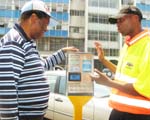Council’s hot potato

Kabvuru cites two reasons for abandoning her vehicle in favour of public transport to commute to work.
“Firstly, the amount of US$1 which they charge for parking per hour is too much for me if you consider that I have to fork out more than US$200 at the end of the month,” she said.
“Secondly, there is no alternative parking space. I have tried the few parkades, but they are always full as people are now competing to get the space.”
The Harare City Council says the project would be fully implemented on all streets in the city by the end of the year.
But the city council has since sparked controversy over the way it has implemented the new parking bays.
Many people are questioning the logic of the municipality in hiring a South African company to manage the new parking bays.
There are many issues surrounding the deal, which observers say need to be looked into before the parking bays are fully implemented.
Observers and council insiders say the fact that the city council did not put to tender the establishment of the parking bays is a breach of procedures.
The issue has already caused some discomfort within the city council, with some officials said to be against the way the parking bays are being handled.
A council official said last week that a stormy meeting was expected between the city officials and Easy Park.
Some authorities would seek answers to the way the deal was handled, especially why Easy Park was charging US$1 per hour, an amount considered to be too high.
The official said there was no doubt that the council’s decision to partner with Easy Park in the parking meters project was shrouded in controversy.
He said some questioned why the company was chosen ahead of local companies that are capable of providing similar services.
Yet some believe that there were underhand dealings that resulted in Easy Park being contracted.
“The Easy Park issue is a hot potato at council at the moment because as well as the high parking fees, there are questions as to whether proper procedures were followed to partner the company in the project,” said the official.
“Also, there is a general feeling that indigenous companies should have been given preference.”
Some have also raised questions whether it is considered right for Easy Park to display South African flags on uniforms worn by parking marshals.
Although the introduction of the parking meters is a noble initiative, as it seeks to control traffic congestion, city authorities would definitely pay attention to the furore that has preceded the project.
Some say there needs to be consultations with motorists to incorporate their views.
Although town planners have always maintained that on-street parking bays in the city centre are meant for people doing quick business such as banking and shopping, they also need to consider that the city does not have enough parkades for motorists.
Wide-ranging consultations should have been held with all relevant stakeholders to map the way forward.
There is no doubt that a vicious war is erupting on Harare’s main streets.
Since the parking meters were introduced along Nelson Mandela Avenue as a pilot project, motorists and the parking marshals have been involved in numerous quarrels, some of which have turned ugly.
Hardly a day goes by without an altercation between parking officers and motorists, as the drivers cry foul over what they view as exorbitant parking fees being charged by the council.
There are stiffer penalties for motorists that defy the parking law, as their vehicles are clamped instantly and they have to pay a US$57 spot fine to have the clamps removed.
Failure to pay this amount results in a further penalty of US$169 to retrieve the vehicle from the city council’s storage centre, where each vehicle is also charged overnight fees of US$11.
“The parking fees are just too high if you compare with other countries in the region,” said Mr Bernard Lunga, deputy chairperson of the Transport Operators’ Association of Zimbabwe.
A snap survey carried out by The Sunday Mail In-Depth showed that although the parking meter system is common in other Southern African countries, the fees in Harare could rank amongst the highest in the region.
In South Africa, Swaziland and Namibia, for example, it costs between R2 and R5 per hour to park in the major streets.
But other motorists believe the parking meters are just what the doctor ordered for the city.
“Hats off to the Harare City Council for re-introducing electronic multi-bay parking meters,” said a Harare motorist who wrote a comment to the letters section of a local daily.
“It was hell for motorists to find parking, especially in the CBD. From just the few days since the installation of the electronic meter, there is parking sanity along Nelson Mandela. One can easily find a parking bay without hassle.”
The city authorities have always maintained that the introduction of the parking meters is a measure to control the huge traffic volumes, which are a common feature in the city centre.
The operations manager for Easy Park, Mr Yakub Mussa, said the parking meters were an absolute necessity because traffic congestion had become unbearable for some motorists.
He said the company was receiving plaudits from some motorists satisfied by the reduction of traffic volumes along Nelson Mandela, where the first parking meters have been installed.
“Many motorists are happy,” said Mr Mussa.
“We have received praise from motorists who said that they had not been able to do shopping at OK and Savemor supermarkets along Nelson Mandela Avenue for quite some time, but only started doing so after we introduced the parking meters.
“The parking meters are good for the city because traffic congestion has always been a big problem in Harare.”
Mr Mussa said the parking meters system was not a new system because as it had been implemented with measurable success in Harare in the 1980s.
“Before we installed the parking meters, we did our research and discovered that the meters were installed in Harare in the 1980s but were vandalised,” he said.
Mr Mussa said Easy Park was clamping an average of 12 cars a day.
He said there are 157 parking bays along Nelson Mandela Avenue, which means the council and the Easy Park could be raking in thousands of dollars from the parking fees everyday.
On the US$1 fees, which motorists deem too high, Mr Mussa said the company, which is in a 60/40 percent joint venture with the council, would consider reducing the fees in the future.
“One of the reasons why we charge dollar per an hour is because of the shortages the smaller denomination currencies,” he said. “We hope to reduce the fee in the near future.”
Mr Mussa said his company had “received offers to install the parking meters in other towns and cities in the country”.
The move by the city council obviously needs to be complemented by the establishment of alternative parking space on the outskirts of the city.
City authorities say the new parking bays would ensure the end to self-appointed parking marshals who had demarcated the city into fiefdoms.
The touts were taking advantage of the laxity of the city council on the parking bays and were pocketing as much as US$50 per day from motorists.
They would take it upon themselves to assign parking bays to motorists and then demand cash before the vehicle would leave.
But it is the contracting of a foreign company to manage the parking bays and the US$1 charge per hour that are set to cause a stormy debate for some time to come.







Comments